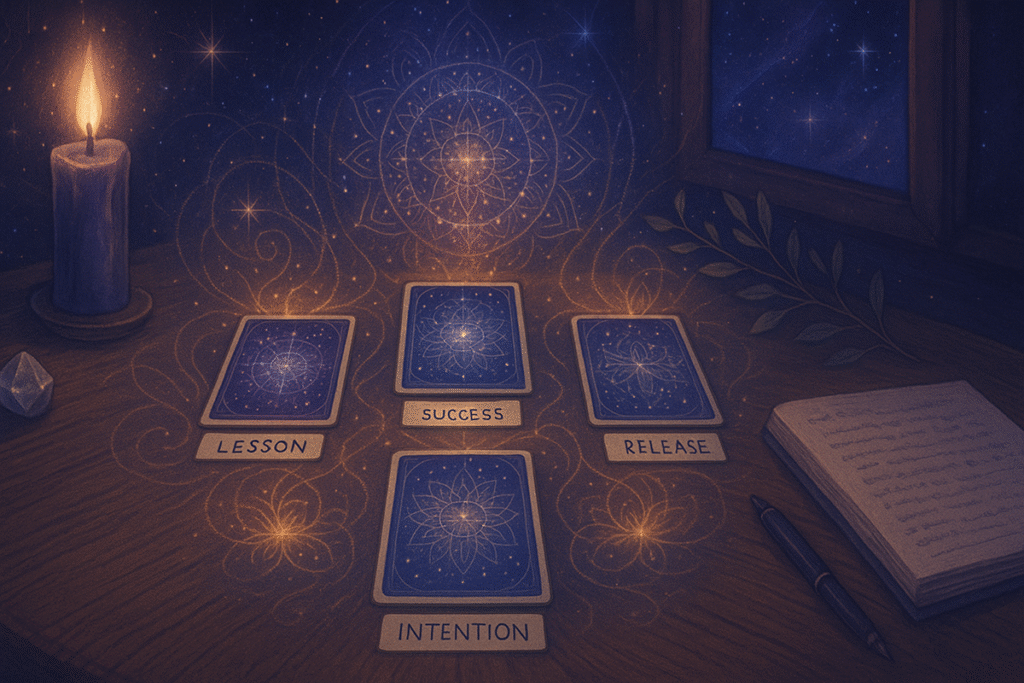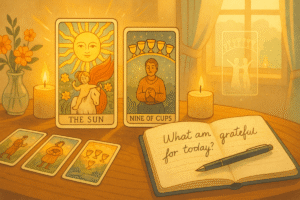Table of Contents
Sunday evenings have always felt like a natural pause button for me. There’s something about that liminal space between one week ending and another beginning that invites deeper contemplation. Perhaps it’s the way the light shifts differently, or maybe it’s simply our collective understanding that Monday brings fresh possibilities. Whatever the reason, I’ve found that creating a weekly tarot spread ritual has transformed these quiet moments into powerful opportunities for self reflection and intentional living.
The practice I’m sharing today isn’t about predicting what will happen in your week ahead. Instead, it’s designed to help you process what you’ve experienced and clarify what you want to cultivate moving forward. Think of it as a gentle conversation with yourself, using the symbolic language of tarot as a bridge to deeper self awareness.
Why Sunday Works for Weekly Reflection
I’ve experimented with different days for this practice, and Sunday consistently feels the most natural. There’s a particular quality to Sunday energy that seems almost designed for introspection. The weekend has given us some distance from the intensity of the work week, but we haven’t yet been pulled back into Monday’s momentum.
This timing also aligns with how many of us naturally think about our weeks. Sunday evening is when we mentally prepare for what’s coming, review our calendars, and set intentions. Adding a tarot component to this existing ritual feels organic rather than forced.
The key is consistency. I think the magic happens not in any single reading, but in the accumulation of weekly check ins with yourself over time. You begin to notice patterns, celebrate growth, and develop a more nuanced relationship with your own inner wisdom.
The Five Card Sunday Reset Spread
This spread uses five cards arranged in a simple line, each with a specific purpose in your weekly reflection process. I’ve found that five cards hits the sweet spot between being comprehensive enough to offer real insight while remaining manageable for a regular practice.
Here’s how the positions work, though I encourage you to adapt them if different questions feel more relevant to your life:
Position 1: A Key Lesson from the Week Past This card invites you to consider what the previous week taught you about yourself, your relationships, or your approach to challenges. Sometimes the lessons are obvious, other times they’re subtle shifts in perspective that only become clear when we pause to look back.
Position 2: A Success to Celebrate We’re often quick to move past our accomplishments without really acknowledging them. This position encourages you to recognize something you handled well, a moment of growth, or simply something that brought you joy. The definition of “success” here is entirely yours.
Position 3: What to Consciously Release This might be a habit that’s no longer serving you, a worry you’ve been carrying, or an expectation that’s creating unnecessary pressure. The act of identifying what you’re ready to let go of can be surprisingly liberating.
Position 4: A Guiding Intention for the Week Ahead Rather than setting rigid goals, this card helps you identify a quality or focus that you want to embody. It might be patience, creativity, courage, or simply being more present in your daily interactions.
Position 5: Advice on How to Embody That Intention This final card offers gentle guidance on practical ways to live out your chosen intention. It’s not about following instructions, but rather about sparking ideas for how you might approach your week differently.
Setting Up Your Space and Mindset
I’ve learned that the physical environment really does influence the quality of these sessions. You don’t need anything elaborate, but creating a sense of ritual helps signal to your mind that this is sacred time for self reflection.
Find a quiet spot where you won’t be interrupted. I prefer my kitchen table in the evening when the house is settling into quieter rhythms. Some people love doing this practice outside when weather permits. The key is choosing a location that feels both comfortable and slightly special.
Light a candle if that appeals to you, or perhaps make a cup of tea. These small acts of preparation help create a boundary between your everyday mindset and this more reflective space. I’ve noticed that when I skip these preparatory steps, my mind tends to stay scattered and surface level.
Before drawing your cards, take a few moments to mentally review your week. You’re not trying to analyze or judge what happened, just allowing the experiences to surface naturally. What moments stand out? What emotions did you experience most frequently? What challenged you, and what felt easy?
Working with Your Cards
Draw all five cards at once, laying them out in a straight line from left to right. I prefer to turn them over simultaneously rather than one by one, though some people enjoy the anticipation of revealing each position individually. Trust your instincts about what feels right.
Look at the overall energy of the spread first. Are the cards mostly bright and energetic, or do you see themes of introspection and inward focus? Are there repeated colors, symbols, or suits that catch your attention? Sometimes these broader patterns offer insight before you even consider individual card meanings.
Then spend time with each position separately. I find it helpful to journal about each card, writing whatever comes to mind without censoring myself. The goal isn’t to demonstrate perfect knowledge of tarot symbolism, but to use the imagery and your intuitive responses as catalysts for self discovery.
For the lesson card, you might ask yourself: What does this image remind me of from my week? What feelings does it bring up? If this card were describing something I learned, what might that be?
With the success card, focus on what you want to acknowledge about yourself. Even if the card seems challenging at first glance, look for ways it might represent growth or strength you demonstrated.
The release card often brings up the most resistance. That’s natural. Sometimes we’re not ready to let go of what we know we should release, and that’s okay too. Acknowledging the resistance is valuable information in itself.
Making It Your Own
This spread is meant to be a starting point, not a rigid formula. After using it for several weeks, you might discover that different questions serve you better. Perhaps you want to add a sixth card for “something to pay attention to this week” or replace one of the existing positions with “how I can better support myself.”
Some people prefer to pull a single card for the entire week and then reflect on how its themes showed up. Others like more complex spreads that address different life areas separately. The important thing is finding an approach that you’ll actually stick with consistently.
I’ve also found it helpful to keep brief notes about each week’s reading. Not elaborate interpretations, but just a few words about what stood out or what insights emerged. Looking back over months of these notes reveals patterns and growth that would otherwise go unnoticed.
The Ripple Effects of Regular Practice
What surprised me most about establishing this weekly ritual wasn’t the individual insights, though those have been valuable. It was the way regular self reflection began influencing how I moved through my days.
When you know you’ll be reviewing your week on Sunday, you start paying closer attention to your experiences as they happen. You notice your reactions more clearly. You become more curious about your patterns and more intentional about your responses.
This isn’t about self judgment or trying to optimize every moment. It’s about developing a kinder, more aware relationship with yourself and your life as it unfolds.
The practice also creates a sense of continuity between weeks. Instead of feeling like you’re constantly starting over, you begin to see each week as part of a larger story of growth and discovery. Challenges feel more manageable when you trust that Sunday evening will bring an opportunity to process and integrate whatever you’re experiencing.
Perhaps most importantly, regular weekly reflection helps you recognize that you already possess most of the wisdom you need. The cards don’t provide answers so much as they create space for the answers that are already within you to surface and be acknowledged.
This Sunday, consider setting aside thirty minutes to try this practice for yourself. You might be surprised by what you discover in those quiet moments of reflection and intention setting.
Frequently Asked Questions
What time on Sunday should I do this spread?
The beauty of this practice is that it works whenever Sunday feels right for you. Most people find Sunday evening ideal because it creates a natural bridge between the weekend and the upcoming week, but if Sunday morning or afternoon fits your rhythm better, that’s perfectly fine. The consistency of doing it weekly matters more than the exact hour, so choose a time when you can be present and uninterrupted.
Can I adapt the card positions to focus on different questions?
Absolutely. After using the spread for a few weeks, you’ll likely discover which questions resonate most with your needs. Some people prefer to ask about emotional patterns rather than successes to celebrate, or they might want to focus on relationships instead of general intentions. The five card structure is meant to be a starting framework that you can customize as you learn what serves you best.
What if I get a challenging or confusing card in the success position?
When a card that seems difficult appears in the success position, look for the growth or strength it represents rather than its surface meaning. Perhaps a card like the Five of Cups in this spot is highlighting your ability to process disappointment with grace, or the Tower might represent your courage in letting go of something that wasn’t serving you. Success isn’t always bright and shiny; sometimes it’s about how we handle the hard moments.
Should I keep a record of my weekly readings?
Keeping brief notes can be surprisingly valuable, even if it’s just jotting down which cards appeared and one or two insights. Over time, these notes reveal patterns in your life and growth you might otherwise miss. You don’t need elaborate journaling; just enough to jog your memory when you look back after a few months of weekly practice.







